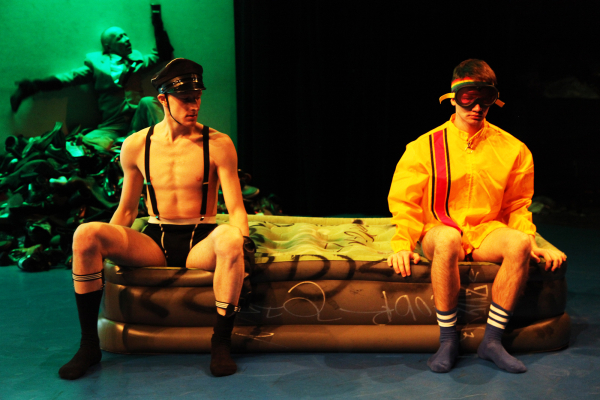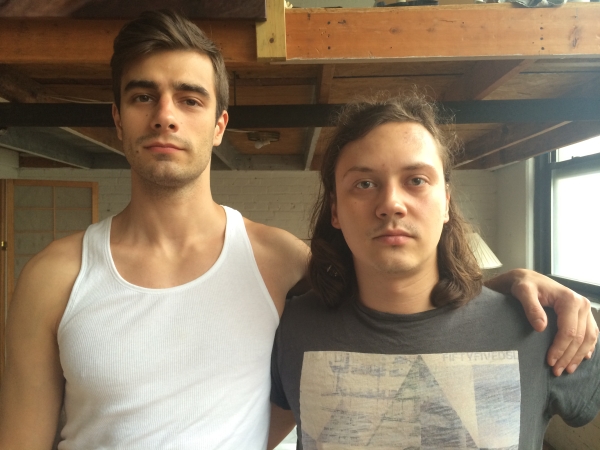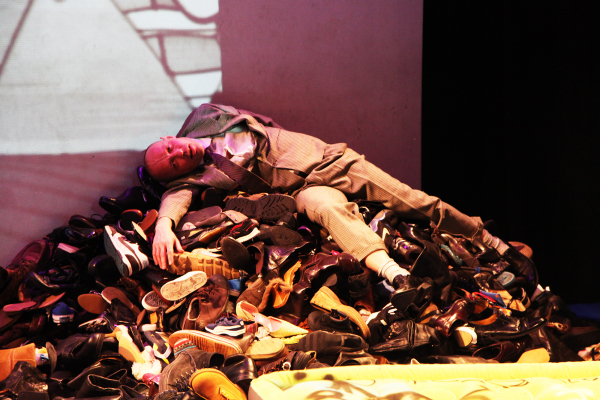Crematorium Collaborators Alexander Kargaltsev and Pavel Solodovnikov Discuss Russia, Ukraine, and Their Latest Show

(Courtesy of Alexander Kargaltsev)
"You should have the red sauce," director Alexander Kargaltsev told his longtime friend and collaborator, actor Pavel Solodovnikov, as they considered their options at a midtown diner. It's an unconventional choice on linguine, but Kargaltsev is anything but a conventional theater director. Solodovnikov took the direction, a sign of faith in his fearless leader. He didn't look disappointed by the end.
A gay asylee from Russia, Kargaltsev is helming the world premiere of Valeriy Pecheykin's Crematorium, which will run at Shetler Studios (May 29-June 1) and the Gene Frankel Theatre (June 11-14), following a recent workshop at Dixon Place.
The play offers a dystopian take on the lives of gay Russians. Written in Moscow, it's premiering in New York City as a result of Russia's controversial "gay propaganda" law, which makes the public performance of plays, and other materials sympathetic to LGBT people, a criminal offense.

(© Dmitry Korabelnikov)
The listing for the production describes it as such: "In the south of [Russian President Vladimir] Putin's Crimea, a giant factory with chimneys is built: a crematorium for gays." This frightening image recalls the horrors of the Holocaust in Hitler's Germany. Yet Pecheykin's text makes little mention of this Crematorium, nor does it say anything about Crimea, the region of Ukraine recently annexed by the Russian Federation.
"This started as a gallery show," Kargaltsev recalled. "We wanted to take the audience through a tour of an actual crematorium where you would see the ovens and chimneys." The concept was so hyper-theatrical, however, that he decided to enlist Pecheykin to write a script. What he came up with was a series of nightmarish vignettes: a clandestine meeting in a hotel, a stunning act of neighbor-on-neighbor violence, an interrogation by a shadowy government figure. All of these moments offer a sense of what it feels like to live as a gay person in Russia today, and a terrifying hint at what it may be like tomorrow. Rather than fashioning these scenes into an airtight plot, Kargaltsev describes his job as "editing different moods and visual concepts."
His vision is crucial considering the fact that the playwright is never in the room for rehearsals. Pecheykin currently lives in Moscow, with no plans to visit New York during the production schedule. How do you mount a new play when the author lives on the other side of the world? Technology. "Sometimes we all talk by Skype," Kargaltsev said.
Solodovnikov, who appears in several roles, insisted that even though the play has been translated into English by Zhenya Pomerantsev and John Turiano, he can hear Pecheykin's voice in the text. "When I listen to other actors saying the lines, I can literally hear the intonation Valeriy would use." Of course, Kargaltsev has hired a very boutique group of actors for this show.
The cast is made up primarily of Russian-speaking Americans and several asylum-seekers from Russia. This has led to an odd situation in which lines are spoken in English, but direction is often given in Russian. "I like when the actor can understand Russian," Kargaltsev said, explaining that it is easier for him to unpack big concepts and moments in his native tongue. "It is very helpful when I am directing." And considering the fact that so much of the play exists outside of the dialogue, a working knowledge of Russian is a prerequisite.
"Russians believe that the text is the last bullet you shoot at the audience," Solodovnikov explained, insisting that it is impossible to get the full feeling of the show simply by reading the script. This is in sharp contrast with the commonly held belief in the American theater that the text is the lifeblood of the play, the ultimate source of action and events. Of course, considering the origins of Crematorium, this alternative approach makes sense.
So what does Crematorium have to do with the war in Ukraine? "The play is a contemporary piece and events are developing fast," Kargaltsev responded. "There's a war there right now. There are crematoriums in war." Kargaltsev sees a direct relationship between the rising nationalism in Russia and the deteriorating situation for LGBT people. "After the laws [the propaganda law and a law that bans adoptions by people from countries with legal same-sex marriage], it has gotten much worse."
"This is causing a mass emigration of Russians abroad," added Solodovnikov, who is straight, but worries about the implications the tolerance of anti-gay violence will have for Russian society. "It's very dangerous."
Solodovnikov and Kargaltsev are living proof of that migration, members of a community of exiled artists that is sure to grow in the coming years. And despite the obvious challenges of making a life in the theater here, both men steadfastly claim to have no regrets in moving to New York City. "I didn't want to stay and fight," Kargaltsev said, recalling his life in Moscow. "I choose to live life and create art. I can protest through my art."

(Courtesy of Alexander Kargaltsev)












